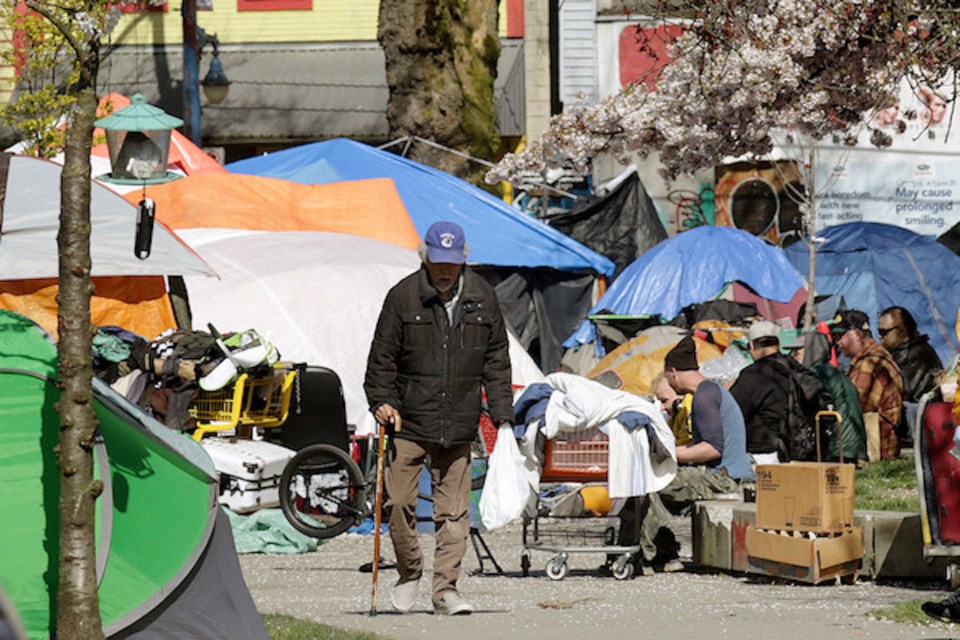The province has issued an immediate evacuation order to remove hundreds of homeless people from British Columbia’s largest tent encampments into hotels and community centres left empty due to the COVID-19 pandemic.
The move, announced Saturday, April 25, will include those living in tent encampments at Oppenheimer Park in Vancouver, as well as Topaz Park and Pandora Avenue in Victoria, a total of approximately 700 people.
Provincial authorities say the temporary housing measures will remain in place for three to six months.
The government said the support measures include a safe and managed supply of drugs and alcohol, women-only spaces, and culturally appropriate supports for Indigenous people. The province also noted they have contracted a moving company to help bring along people's personal belongings.
In announcing the plan, Minister of Social Development and Poverty Reduction Shane Simpson said the camps represented an “elevated risk” for the transmission of COVID-19 as it’s become impossible to physically distance.
To make matters worse, Simpson said that in recent days, health care workers have been forced to withdraw their services for safety reasons, though no cases of COVID-19 have been isolated at any of the camps, said officials.
Public health workers, police and non-profit outreach staff will provide oversight for the move, described as temporary until more long-term solutions can be put into place.
People will begin moving out of the encampments April 26, and with 20 to 30 people moved daily, authorities plan to have all camps evacuated by May 9.
The removal will be carried out under the Emergency Program Act, triggered by Minister of Public Safety and Solicitor General Mike Farnworth’s declaration of a provincial state of emergency.
“This is a public safety order. Not a health order,” said Farnworth in the announcement Saturday. “As an order, police and other compliance officials are able to enforce any violations of this act.”
Security measures are rolling out to ensure compliance and the evacuation order is not optional. A security perimeter will be established around the Oppenheimer Park encampment to prevent anyone from entering, and those choosing not to leave will be in breach of the order and subject to fines, said officials.
While the province is willing to use police to enforce the order, officials expect voluntary compliance and said they have put into place a range of supports to help vulnerable people, including meals, medical care and ongoing cleaning to ensure hygienic living spaces.
In Vancouver, a total of 686 spaces have been made available, nearly double the number of people at Oppenheimer Park. Most of the people will be moved to either one of eight hotels, though 64 beds have been made available at the Coal Harbour Community Centre and a further 79 beds at the Roundhouse Community Centre. Some of the space will be used to treat anyone coming down with COVID-19.
None of the hotels have been named.
Simpson said he’s confident enough space can be found without having to requisition hotel rooms under emergency orders.
“We’re working with hotel associations, with private hotel owners and with local government to look at hotels, to look at community centres, to look at other spaces,” he said.
“We’re very confident that we will acquire those spaces through cooperation, through lease agreements, to be able to move forward.”
Simpson said the hotel rooms will be managed by experienced non-profit housing providers with staff on site at all times of the day. People moving into hotel rooms will have “wrap-around supports,” he said.
The announcement comes within weeks of the fourth anniversary since the province first declared a public health emergency around the opioid epidemic. Since 2016, over 5,000 people have died in B.C. as a result of an overdose, often due to a drug supply tainted with opioids like fentanyl.
The evacuation, said Minister Simpson, is the first step in a plan to get the most vulnerable people off the street for good.
The province did not reveal the cost of the move, but did note it falls under the government’s $5 billion response package to manage the COVID-19 crisis.



